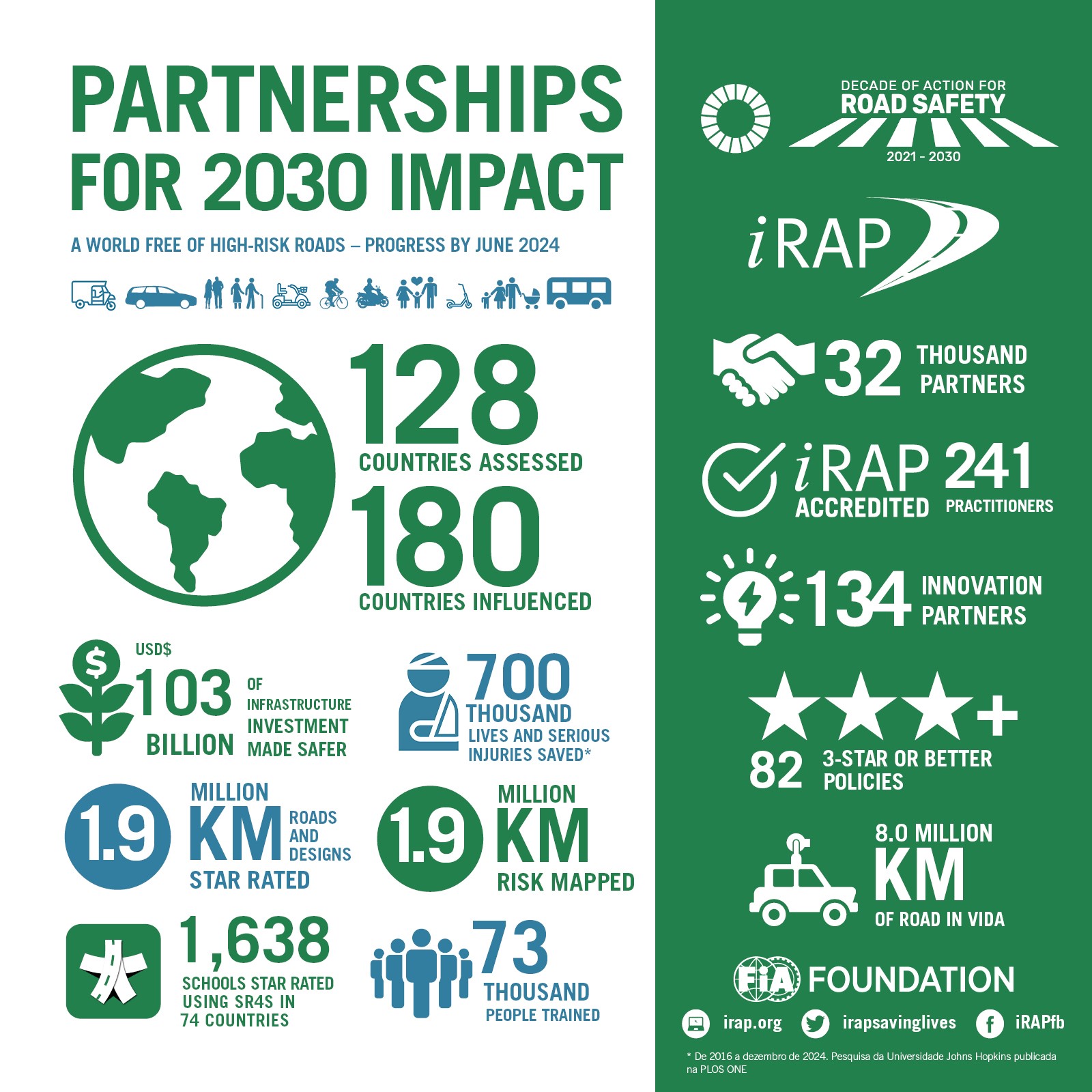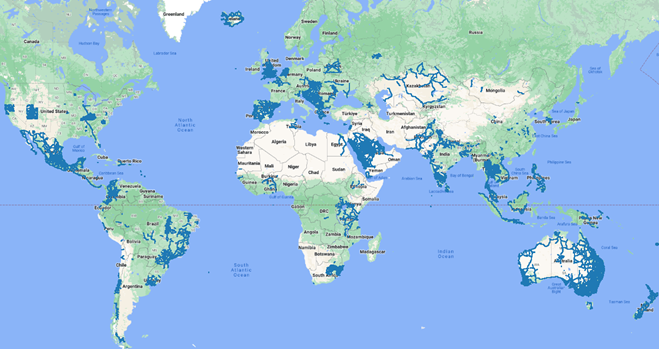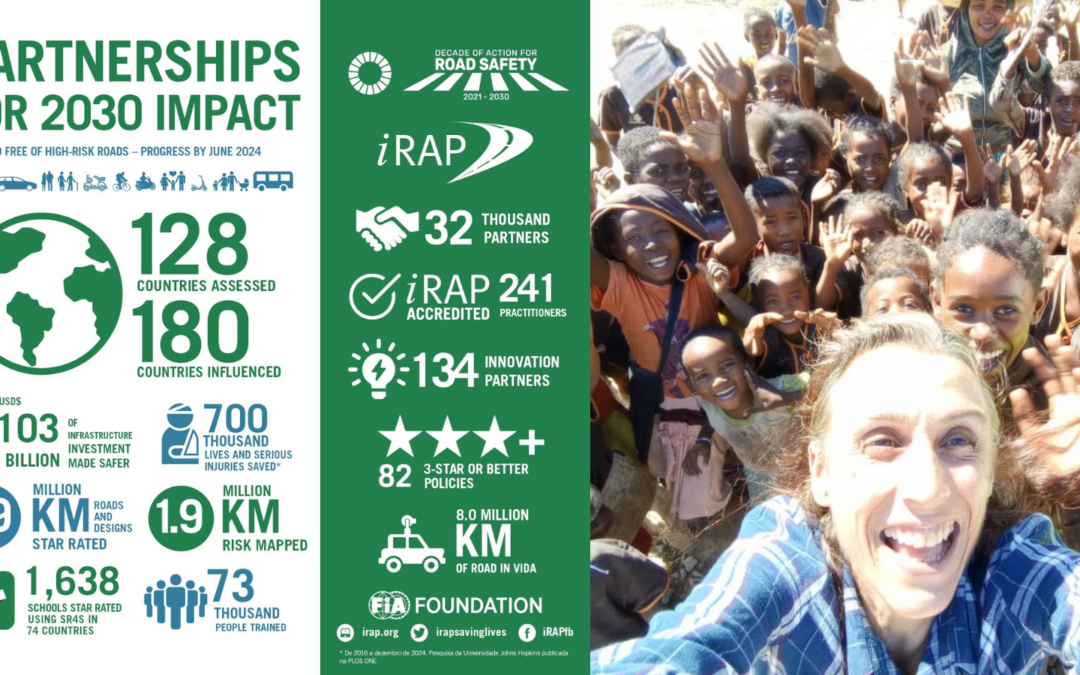Our latest global programme metrics demonstrate the incredible power of iRAP partnerships for safer roads – the saving of 700,000 lives and serious injuries since 2016, impact in 180 countries, 3.8 million km of road safety assessments, 73,000 people trained and USD$103 billion of infrastructure investment made safer … plus more.
Twice a year, in June and December, we analyse our global systems and consult with partners to prepare a comprehensive analysis of iRAP partner activity across the globe to eliminate high-risk roads. It’s an important task to guide and quantify collaborative impact and return on investment, and celebrate success across the world.
The results as at 31 June are so inspiring, thanks to the support of our major donor the FIA Foundation; programme supporters Global Road Safety Facility, 3M, Prudence Foundation, Aleatica Foundation, Millennium Challenge Corporation, European Investment Bank and FedEx; and incredible work from our 32,000 partners worldwide:

Download the iRAP Metrics Infographic in English, Portuguese or Spanish.
Highlights include:
- Research by Johns Hopkins University, published in the respected journal PLOS One, estimates that iRAP partners have prevented almost 700,000 deaths and serious injuries using the iRAP methodology and tools to inform road safety infrastructure changes and safer speeds between 2016 and the end of 2024.
- 1.9 million km of roads and designs have been Star Rated and 1.9 million km have been Crash Risk Mapped in 128 countries.
- These are helping to inform US$103 billion of safer roads upgrades for pedestrians, bicyclists, motorcyclists and vehicle occupants. In the last six months, significant investment programmes have been identified in Australia (an additional $1 billion), Saudi Arabia (a $300 million maintenance programme) and the United Kingdom ($46.6 million to improve road safety on 17 of England’s most high-risk roads).
- In the last 6 months, Star Rating assessments have been conducted in 20 countries, with:
- Very large assessments in Thailand (38,623km), Australia (29,490km) and the Kingdom of Saudi Arabia (17,235km as part of the world’s largest ever iRAP assessment at 72,000km). Assessments of >1,000km were also undertaken in Sri Lanka, USA, Mexico, South Africa and Czechia.
- In total, 8 million km of full Star Rating analysis and investment scenarios have now been undertaken in iRAP’s free software platform ViDA used by more than 20,400 RAP partners.

ViDA Star Rating Assessments Map (excludes Risk Mapping)
- In Western Australia, LGStars, a tailor-made Safety Ratings Tool for the state’s Local Governments developed within iRAP’s Innovation Framework, has processed nearly 3,500km of light Star Ratings. Also in the State, the world’s largest 20,000km AiRAP assessment is underway using automated feature extraction from LiDAR point cloud and imagery to support an AusRAP Star Rating assessment. Australia’s states and territories will commence publishing updated AusRAP star ratings this year, with a commitment to publish star ratings for all major arterial roads by 2025 towards supporting the national road safety objective of ensuring that at least 80% of travel occurs on roads with a 3-star rating or higher by 2030.
- Also in Australia, the State of Queensland has recently completed 21,500km of Risk Mapping to understand the crash risk on the State’s regional high-speed road network. The results are helping to inform safer roads investment and RACQ club advocacy. The RACC Mobility Club and Real Automóvil Club de España (RACE) also presented their 20th edition of annual Crash Risk Mapping of the Spanish road network, analysing the safety of 25,100km.
- Over 57,300km of designs have been Star Rated globally, with important designs analysis occurring this period in India, Australia, Malawi, Cameroon, Cambodia, Kazakhstan, Chile, Pakistan and Chile. Additional designs are also being made safer supported by other iRAP Tools such as the Star Rating Demonstrator, with 2,224 users of the Demonstrator tool in the last six months.
- The Star Rating for Schools (SR4S) programme continues to create heartwarming and inspirational stories of school journeys being made safer across the world. 1,638 schools have been assessed by SR4S partners across 74 countries, impacting the safety of an estimated 426,796 students. SR4S assessments were completed for the first time in Armenia (assessing 40 schools), Bolivia, Haiti and Madagascar. Vietnam leads the world with the highest number of schools assessed (244), followed by The Philippines (234 school assessed, adding an additional 109 schools in the last 6 months), and India (117). USA, Uruguay, South Africa, Guatemala, Argentina and Ghana have all assessed more than 50 schools using the tool. The Youth Engagement App (YEA), developed as part of the Botnar Ai&Me project, has been highly successful in capturing youth perceptions of risk, providing important qualitative data to support SR4S results. The outcomes of the project and a recently published Scalability Report are informing the feasibility of the Ai&Me digital framework for application in other countries.
- The USD$2 million Google.org grant awarded to iRAP to leverage Artificial Intelligence (AI), SR4S and AiRAP partnerships is underway to scale up 3-star or better school journeys in Vietnam and the world.
- 73,097 people have been trained in 166 countries since 2005 (adding nearly 4,000 people trained in the last six months). For the first time, people have received iRAP training in Sudan and Gabon. Training events have also been held locally for the first time in Estonia, Finland, Kyrgyzstan, Oman and Switzerland. Courses have been delivered in 22 languages, with a recent addition of Dutch and Greek. The #RAPKnowledgeLIVE series has seen two webinars hosted to boost capacity in the use of our tools and resources. The latest webinars took a deep dive into ViDA, iRAP’s free global road safety platform analysing the safety of roads worldwide, and shared tips on using Power BI for data driven insights. To celebrate International Women in Engineering Day on June 23, iRAP has offered training grants to 30 female engineers. Check out our training programme at https://irap.org/training/, with many courses available in online, self-paced format.
- iRAP’s Accreditation Programme is supporting 241 accredited practitioners and 18 systems in 45 countries, helping to ensure iRAP specification services are delivered to the same consistent global standard no matter where you are in the world. The last six months have seen the first accreditation of practitioners in Kazakhstan (accrediting 22 practitioners this period) and Lithuania. Client feedback forms continue to rate iRAP Accredited Practitioners with excellence. Agilysis, Anditi and TomTom are Accredited AiRAP data suppliers capable of producing data for particular attributes and regions in accordance with the iRAP Coding Manual.
- iRAP’s Innovation Framework is supporting 134 partners (adding a further 17 partners this period) in projects and initiatives to create the global and local tools to meet local needs and ensure continuous improvement of the iRAP offering.
- Decimal Star Ratings are being introduced across all of iRAP’s tools to provide a more granular understanding of road safety, supporting effective management and communication.
- iRAP is supporting the IVORY network which has opened 15 fully funded PhD positions covering all aspects of AI in road safety – engineering, human factors, computer science, and ethics of technology.
- Four trusted suppliers are supporting CycleRAP projects and the CycleRAP Demonstrator tool in five languages is aiding the quick assessment of cycling and light mobility infrastructure safety in 21 countries.
- New data has been unveiled in iRAP’s Safety Insights Explorer, a critical datahub for decision-makers and partners worldwide seeking to understand the true extent of road trauma, the safety of the world’s roads, and the positive impact that can be made with targeted investment.
- Since June, an additional six countries published national strategies or action plans with iRAP targets for safer road infrastructure bringing the total policy sum to 82. Recent additions include the 2023 IEMA Environmental Assessment of Traffic and Movement Guideline (UK), 2023-2028 Philippines Department of Public Works and Highways Strategic Plan (INFRAGENDA 2028), 2023-2030 Peru Multisector Road Safety Strategy, 2024 PIDG Project Guideline, 2024 West African Road Safety Organisation (WARSO) Conakry Declaration and 2024-2028 Kenya National Road Safety Action Plan. See the global showcase at https://irap.org/policies-into-practice/.
- 25 Strategic Project partnerships were supported in the last six months including during 2024 in Thailand, Australia, Chile, Colombia, Saudi Arabia, Vietnam, Malawi, South Africa, Mozambique, Morocco, Ecuador, Costa Rica, Uruguay, Kyrgyzstan, Tajikistan, Uzbekistan, as well as projects with global impact. Some notable multi-national collaborations include: the long-term support programme partnership underway between iRAP and the Millennium Challenge Corporation (MCC) from 2022-2026 to stimulate safer roads progress in low- and middle-income countries; the EU-funded project PHOEBE which aims to develop an integrated, dynamic, human-centred, predictive safety assessment framework for vulnerable road users in urban areas in three pilot cities/counties of Athens, Valencia and West Midlands; the ELABORATOR project for designing sustainable urban mobility towards climate neutral cities in Europe.
- MexiRAP and BrazilRAP Sao Paulo launched mid-year. As well as supporting our established ‘x’RAP programmes, interest for new RAPs is being supported in Malawi, Chile, Korea, Senegal, Tunisia, Ethiopia, United Arab Emirates, Morocco, Indonesia, Somalia and Vietnam.
Tracking iRAP’s global programme is made possible thanks to our much-appreciated Partner Management System iRAP Connect, facilitated with the generous sponsorship of FedEx and the FIA Foundation.
Insights are shared with partners via the iRAP Partner Portal, now open globally to anyone who’d like to explore iRAP partner news, knowledge, national data and leads, training and projects across the world. Contributions there are also welcome.
For an update on metrics for your country, visit https://irap.org/about-us/where-we-work/.
For an overview of iRAP news in the last 6 months, visit https://irap.org/latest-news/.
To share feedback, take iRAP’s Global Partner Survey.

















